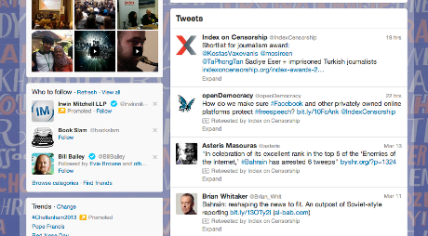
Screenshot of Twitter
When Index on Censorship interviewed the Director of Public Prosecutions Keir Starmer recently, much of the conversation focused on the laws that are used to curb speech today.
Starmer particularly focused on the Communications Act, and specifically Section 127 of that law. This had its roots, he said, in the early days of telephony:
“It can all be traced back to an act from 1935 which was intended to protect the staff in telephone exchanges just as people were beginning to use telephones,” Starmer said. “More people were beginning to use telephones and they wanted to protect exchange staff from, guess what, grossly offensive communications.”
The impulse to protect telephone operators from pests was perhaps a noble one. But nearly 80 years on, the same principle has created a blight on the greatest communications revolution since, well, the telephone.
This problem first registered with the public in the case of Paul Chambers (the now infamous “Twitter Joke Trial”).
During a spell of bad weather in January 2010 Chambers had joked that if a flight he was booked on was cancelled, he would blow Doncaster’s Robin Hood Airport “sky high”. In spite of the fact no one really believed Chambers was making a genuine threat, or even a hoax threat, the trainee accountant was found guilty under Section 127 (his conviction was later quashed on appeal).
The use of that infamous section of the Communications Act led to a rare, and impressive outcry for free speech in the UK.
Why? Because the prosecutions were brought against Twitter and Facebook users. And there are a lot of us.
As millions of us use social media every day, debates around censorship have ceased to be abstract to the vast majority of the population. Standing against censorship is no longer a mere principle: it now looms as a necessity.
About half of the UK’s 62 million people use Facebook, with a similar number using Twitter.
These particular social networks may rise or fall, but social networks are here to stay.
But we tweet and update our Facebook pages subject to laws that were not designed for this phenomenon.
Because no one has quite nailed what it is we do on social media. When student Liam Stacey was convicted in March 2012 after making derogatory remarks about stricken footballer Fabrice Muamba on twitter, there was an interesting debate over what exactly he’d thought he’d been doing, or more precisely what context he’d been doing it in. At the time, I wrote for Index on Censorship:
A row on Twitter is not the same thing as shouting abuse in the street, where there may be immediate physical consequences. Twitter may be like a pub, in the sense that it’s a space for social interaction, but it’s definitely not the pub in that when tempers fray, no one’s going to get glassed. The worst that will happen is someone will block you.
So the physical context of a public order offence is not present in social media interaction. Nor, usually, is the direct communication aspect associated with the Communications Act. What do we think about when we think about tweeting?
We are in whole new terrain for free speech, and we need to be careful how we proceed. Britain’s Crown Prosecution Service has issued new guidelines on social media prosecutions, but there has been no suggestion yet of ditching the law under which these prosecutions are carried out.
As I write, an Irish parliamentary committee is discussing how to deal with online bullying, anonymity and other issues. Among suggestions so far have been a charging system for commenters, or the need to register your passport details when you sign up to a social network. These are ludicrously draconian examples, but they show how reckless legislators can be with our online rights.
Online censorship somehow is not seen as in the same realm as book-burning. The technical ease with which we use the web seems to have led some to a blasé attitude to the inherent value of free speech online.
The fear must be that if international lawmakers do get around to formulating new laws about web communication, they will be inclined to make them heavily censorious.
Written by Padraig Reidy
Padraig Reidy is senior writer for Index on Censorship.



